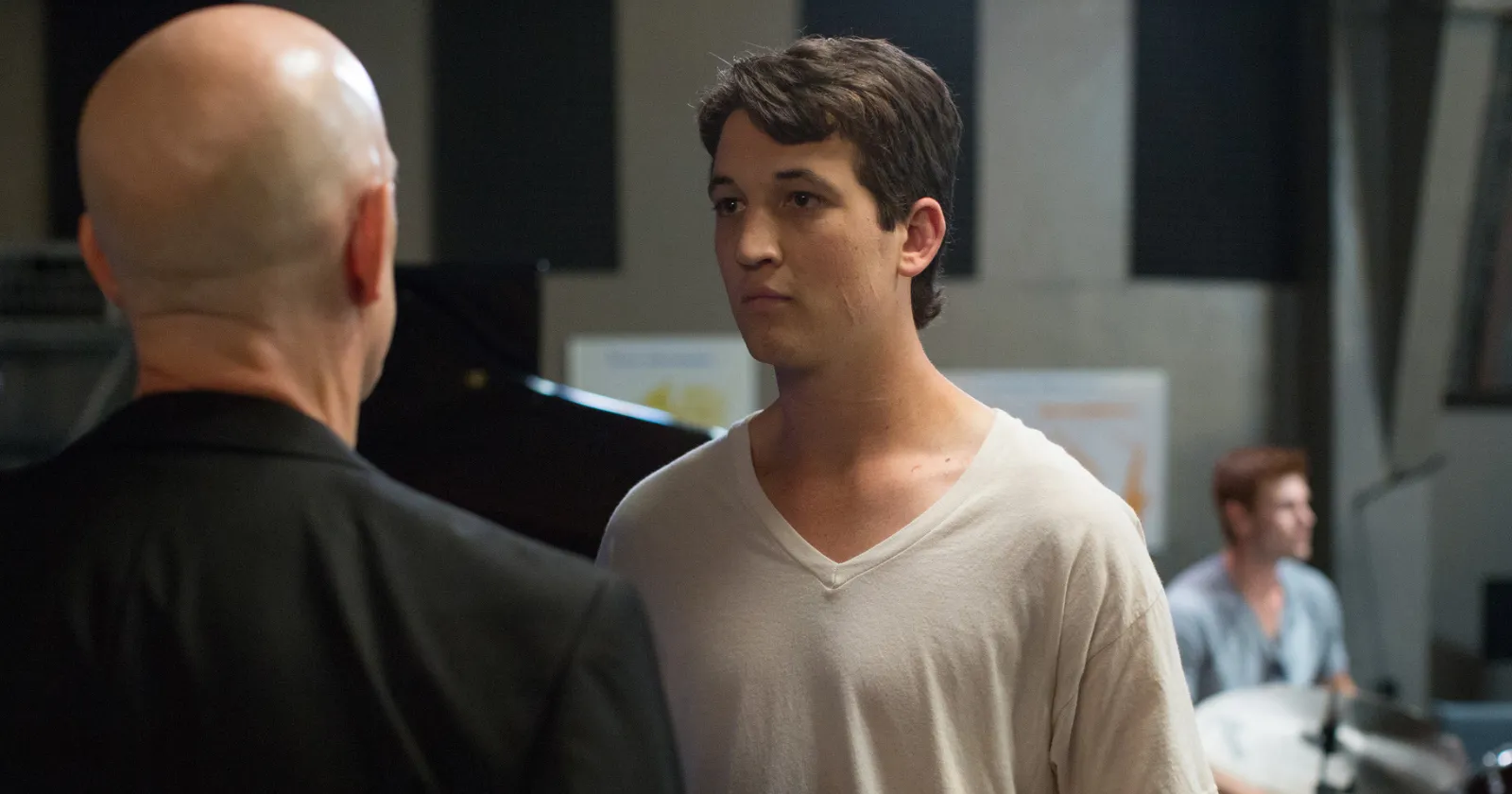Damien Chazelle‘s jazzy powder keg never loses sight of the finish line. Boiling with camera flourishes and hazy sets, Chazelle announces himself with Whiplash as either cinema’s savior or antichrist.

‘Whiplash’ Movie Review
I imagine sometimes it’s just a matter of the right film hitting you at the right time. As a young lad interested in a minute portion of the film medium, I attached myself to Damien Chazelle’s debut film Whiplash and never looked back. Some may say it’s a core text for the eventual style and storytelling conventions that I now gravitate towards quite frequently. Or maybe I find myself relating to the Miles Teller character a bit too much in my daily life. Whatever it may be, Whiplash is a seminal moment for both myself and film industry.
It’s rare to see a rather unknown filmmaker announce themselves onto the scene in the manner that Damien Chazelle did when Whiplash debuted at the Sundance Film Festival in 2014. In a way, Whiplash feels both very Sundance and completely against the norms of what that festival typically champions. On one hand, it piggybacks on the name recognition of J.K. Simmons and Miles Teller (even if Miles Teller wasn’t the Miles Teller post-Top Gun that we know him as today).
On the other hand, it’s deeply unnerving and insular. Typically, the festival promotes movies closer to CODA or The Last Black Man in San Francisco – films with an airier tone and bright color schemes. Whiplash offers little beyond dimly lit, hazy rooms that add to the depressing atmosphere Chazelle seems to let his dialogue live in. He bets heavily on tone in Whiplash with hopes that the abrasive characterization and an aggressive script can win over audiences.
And Whiplash unquestionably does just that. The film sinks into its script from the opening minutes with a career-defining villainous performance by J.K. Simmons. The adrenalin runs through your veins beginning with the brief drum sesh between Simmons’ drill sergeant-adjacent band director Terence Fletcher and Miles Teller’s puppy-eyed Andrew. Chazelle sets the stage early on for a lightning quick, hair raising dual between two forceful characters in the world of jazz music – one that Chazelle clearly feels confident in and continues to work in.
If there’s one feeling that Whiplash exudes at every turn, it’s confidence. The film feels like a director working well into their career, with a handful of successes and flops alike. One that announces someone has reentered their prime. It’s not a film that feels at the hands of a newcomer. It’s as if the self-proclaiming prodigy that enters the Shaffer Conservatory Studio in the film’s opening minutes is a stand-in for Chazelle himself – an indulging, overly self-confident artist capable of shattering boundaries if cooler heads prevail.
Whiplash has ferocious energy that other films dream of having, and sometimes artificially try to build and land flat for. Sometimes, it’s just a matter of having perfect casting for the roles most important. At times, it feels like the whole film was written around J.K. Simmons as a performer. Simmons wins his Oscar for the film, and essentially builds a plethora of nominations off it, too. When pundits carried pitchforks around last year for his nomination in Being the Ricardos, I understood the harsh criticisms they had. After all, the film is simply not very good – but Simmons still holds the screen presence because of the performance he gives in Whiplash. People will always be excited to see him on screen because he was Terence Fletcher.
Few films feel well ahead of their time but also get their accolades in the moment. Whiplash is a launching point for everyone involved. Miles Teller delivers the peaks and valleys for a character arch presented as a good ole fashion rise-and-fall (even if the rise isn’t that monumental and the bottom doesn’t completely cave in on him). I wrote this review initially for the release of Babylon and now critics will say the jury is out on Chazelle, too. Understandably so. Chazelle isn’t one to hold back. Whiplash should’ve been a warning for the weirder, directionless career that one of the industry’s brightest youngsters was about to go on.
For years to come, Whiplash will continuously be reexamined and reappraised for how it exponentially multiplies tension and energy. Few visionaries are able to pull together this level of craft after decades in the business, yet Damien Chazelle was able to do it after a few short films and with a minimal budget. J.K. Simmons is the standout here, mainly because he gets his Oscar and years of future accolades, but Miles Teller also manages to string together a few solid performances after this film, too.
There’s a timeless quality to Whiplash that will keep it in the culture for years to come. It helps that Chazelle keeps getting bolder and bolder with his visions, and no one should be surprised after the volatile trip he takes you on in this one. Whether he crashes and burns like his characters here, or he soars like his protagonists in La La Land or First Man (literally), his films will be stand-ins for the medium’s zeitgeists many decades from now.
Rating: 9/10
Whiplash (2014)
- Cast: Miles Teller, J.K. Simmons, Paul Reiser, Melissa Benoist, Austin Stowell
- Director: Damien Chazelle
- Genre: Drama
- Runtime: 107 minutes
- Rated: R
- Release Date: October 10, 2014
Read More Reviews for Damien Chazelle Movies:
Cinephile Corner has reviewed the following Damien Chazelle movies: